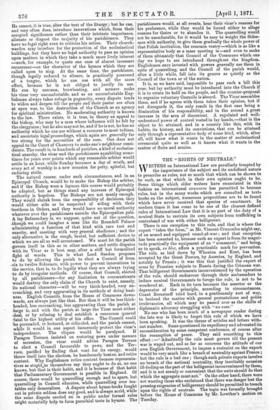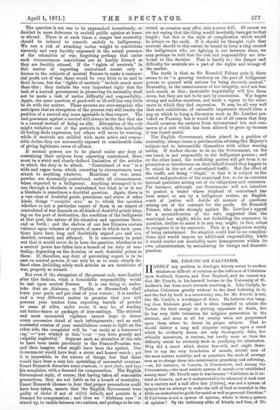THE "RIGHTS OF NEUTRALS."
WRITERS on International Law are peculiarly tempted by the importance of the subject and its undefined nature to prescribe as rules, not so much that which can be shown to
be such, as that which in their own opinion ought to be.
Some things which older writers have enunciated in this fashion an international consensus has permitted to become
rules, but in the many works which are consulted as text- books on the subject, numerous propositions are to be found which have never received that species of enactment. In modern times it has come to be one of the clearest defined rules of International Law that it is no part of the duty of a neutral State to restrain its own subjects from trafficking in contraband of war with either belligerent.
There is one exception to this rule, and that is where the export "takes the form," as Mr. Vincent Crummles might say, of an armed and equipped vessel-of-war ; and that exception has been assented to, because such an export is from its magni- tude practically the equipment of an "armament," and being, so to speak, en bloc, offers a practicable mark for prevention.
The rule, as laid down by Wheaton and Kent, has been accepted by the Great Powers, by America, by England, and notably by Prussia ; it was this that justified the export of arms by Prussian subjects to Russia during the Crimean war. That belligerent Governments inconvenienced by the operation of the rule, should endeavour through their ambassadors to induce neutral Governments to forego the rule, is not to be wondered at. Each in its tarn becomes the assertor or the deprecator of the principle, according to circumstances. Count Bernstorff tried hard, in a gentlemanly sort of way, to becloud the matter with general protestations and polite irrelevancies, all which may be passed over as the shifts of diplomatic advocacy struggling with "no case." No one who has been much of a newspaper reader during the late war is likely to forget this rule of which we have been speaking. It was the theme of articles and letters with- out number. Some questioned its expediency and advocated its reconsideration by some competent conference, of course after the resumption of peace. They said something to this effect : —"Admittedly the rule must govern till the present war is waged oat, and so far as concerns the attitude of our own English Government, to impose a restraint on the export would be very mach like a breach of neutrality against France ; but the rule is a bad one ; though such private exports involve no breach of the national neutrality, they inevitably occasion ill-feeling on the part of the belligerent inconvenienced by them, and it is not seemly or convenient that the units should do that
which the aggregate must not." On the other hand, there were not wanting those who exclaimed that there was danger lest the pressing exigencies of belligerency should be permitted to trench upon the rights of neutrals. The topic was formally brought before the House of Commons by Mr. Lowther's motion on Tuesday. • The question is not one to be approached incautiously, or decided in mere deference to excited public opinion at home or abroad. There is at such times a danger lest neutrality should be induced to concede unduly to belligerency. We run a risk of attaching undue weight to convictions sincerely and very forcibly expressed in the actual presence of the calamities of war, forgetting perhaps that under such circumstances convictions are as hastily formed as they are forcibly uttered. If the "rights of neutrals" in this matter of exporting contraband meant only a licence to the 'subjects of neutral Powers to make a commer- cial profit out of war, there would be very little to be said in their favour, but the "rights of neutrals" include much more than this ; they include the very important .right that the task of a neutral government in preserving its neutrality shall not bet made a task of undue difficulty and responsibility. Again, the mere question of good-will or ill-will has very little
to do with the matter. Those persons are over-sanguine who anticipate that an abrogation of the present rule will render the position of a neutral any more agreeable in that respect. The real gravamen against a neutral will always be the fact that she is a neutral instead of being an ally. Abrogation of the rule might withdraw one of the pretexts in which this inevitable ill-feeling finds expression, but others will never be wanting, while if neutrals are saddled with more active and respon- sible duties they are necessarily exposed to considerable risks of giving legitimate cause of offence.
If neutral powers are to be placed under any duty of restraining their subjects from exporting contraband, there must be a strict and clearly-defined limitation of the articles to which the duty is to attach. "Contraband of war" is a wide and vague term, which, according to circumstances, may attach to anything whatever. Munitions of war, arms, powder, are necessarily contraband, under all circumstances, when exported to a belligerent. Anything attempted to be run through a blockade is contraband, but what is or is not a blockade is sometimes a doubtful question. Again, there is a vast class of doubtful goods, provisions, and stores of other kinds, things " ancipitis 'netts," as to which the question whether or not a particular export of them is an export of contraband of war depends on all kinds of doubtful points hing- ing on the port of destination, the condition of the belligerent at that port, the nature of his situation and operations there, and so forth ; and the shelves of our law libraries contain volumes upon volumes of reports of eases in which such ques- tions have been long and doubtfully argued pro and con, decided, reversed, and affirmed. It is unnecessary to point out that it would never do to have the question, whether or no a neutral power has fallen into a breach of its duty of neu- trality, depending on the decision of such doubtful points as these. If, therefore, any duty of preventing export is to be cast on neutral powers, it can only be as to some clearly de- fined class, including solely such articles as are munitions of war, properly so termed.
But even if the abrogation of the present rule were limited after this fashion, what a formidable responsibility would
be cast upon neutral Powers. It is one thing to under- take that no Alabama, or Florida, or Shenandoah shall leave your ports and get clear of your waters ; it is another and a very different matter to promise that you will prevent your traders from exporting barrels of powder or cases of rifles, under cover, it may be, of sending out butter-boxes or packages of iron-castings. The strictest and most unwearied vigilance cannot hope to detect every successive detail of such infringements ; and as each successful evasion of your watchfulness comes to light on the other side, the complaint will be "as ready as a borrower's cap,"—"you winked at this,"—or "you were grossly and culpably neglectful." Suppose such an alteration of the rule to have been made previously to the Franco-Prussian war, and then imagine what might have been the upshot. Our Government would have kept a strict and honest watch ; yet it is impossible, in the nature of things, but that there would have been a very fair sprinkling of successful evasions. Count Bismarck discovers some evasions, ex post facto, and lays his complaint, with ti demand for compensation. The English Government reply, of course, that having taken all reasonable precautions, they are not liable as for a breach of neutrality. Count Bismarck chooses to deny that proper precautions could have been taken, asserts that the English Government were guilty of la'ches if not of wilful default, and persists in a demand for compensation ; and thus an "Alabama case" is stored up, to rankle between two nations, and perhaps to be con- verted, as occasion may offer, into a emus bells'. Of course we are not saying that the thing would inevitably have got to that length ; but this is the style of complication which would be always on the cards. If it should be thought right that neutrals should to this extent be bound to form a ring around the belligerents who are fighting it out between them, we may perhaps be told that the risk and responsibility are irre- levant to the decision. That is hardly so ; the danger and difficulty for neutrals are a part of the rights and wrongs of the matter.
The truth is that, as Sir Roandell Palmer puts it, there seems to be "a growing tendency on the part of belligerent powers to quarrel with nations for being sincerely neutral." Neutrality, in the consciousness of her integrity, need not fear such moods as this ; inexorable impartiality will live them down, but they are not to be met by concessions. War begets strong and sudden emotions, and lends a vigour to the utter- ances in which they find expression. It may be all very well that such exhibitions of excusable impatience should form a peg on which to hang a discussion such as Mr. Lowther pro- voked on Tuesday, but it would be out of all reason that they should occasion the excision from international law and com- merce of a rule which has been allowed to grow up because it was found useful.
The English Government, when placed in a position of neutrality, always issues a proclamation advising Her Majesty's subjects not to intermeddle themselves with either warring nation. If traders choose to do so, the Government, on the one hand, is not responsible to the belligerent powers ; and on the other hand, the trafficking parties will get from it no protection or interference on their behalf should they happen to be seized in the act of contraband traffic. But the effect of the traffic not being "illegal," is that it is subject to the control and protection of the municipal law, so far as concerns internal questions arising out of its obligations and contracts. For instance, although our Government will not interfere to protect a trader whose shipload of contraband has been seized at sea by a belligerent cruiser, an English court of justice will decide all manner of questions arising out of the contract for the goods. Sir Roundel]. Palmer, who spoke strongly against Mr. Lowther's appeal for a reconsideration of the rule, suggested that the municipal law might, while not forbidding the commerce in question, decline to assist it in any way, might, in fact, refuse to recognize it or its contracts. This is a suggestion worthy of being entertained. Its adoption could lead to no complica- tions, and would impose no additional responsibility, while it would render our neutrality more homogeneous within its' own administration, by assimilating its foreign and domestic practice.

































 Previous page
Previous page